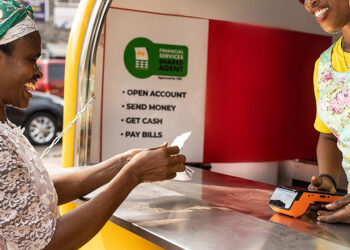At a big society wedding, the Couple’s dance into the venue was one of the highlights of the day. The MC calls out the couple’s friends to form a guard of honour lining up on both sides of the aisle to usher them in.
It is an opportunity for them to show off their dancing skills and sometimes they perform specially choreographed dances to rapturous applause from the audience. As the couple dances into the venue, well-wishers approach them and start to throw wads of freshly minted Naira notes at them or at times place them on the floor in front of them.
This very Nigerian cultural display is repeated and more pronounced when the couple takes to the floor for the first dance and at this stage, the Musician comes into play trying to get the attention of well-wishers as they “spray” the couple money.
‘Spraying “money describes the act of showering any person usually while they dance with physical cash, as a part of celebration and a display of love for the individual in question. It normally involves laying new Naira notes on the person or a group of persons while they dance to the music from a live Band or a DJ. Nowadays, due to health and spiritual connotations, Guests are encouraged to gently lay down the money on a designated mat or basket provided for this purpose while the Celebrant is dancing.
The volume of new Naira notes on display leaves you wondering how they are sourced. This is because as any Nigerian knows when you go to a Bank to withdraw cash, you are rarely ever paid in new notes. So how do people source for and get such humongous amounts that are expended at every social event from weddings, burial ceremonies, birthdays, and child naming ceremonies?
The answer lies in the obscure men and women clutching different bags very close to them and who loiter in and around the venues of social events. While most people are there to have fun, they are there to provide a service from which they earn outrageous profits by selling what is basically our legal tender.
The cost of buying freshly mint naira notes
Currency sellers have increased their cost of buying freshly minted currencies over the years in line with demand and inflation expectations. However, in recent times, the cost of buying is around the following;
- A pack of 100 N200 mint notes worth N20,000 is sold for an extra N8,000, the same as a pack of N100 notes.
- The pack of N1,000 worth N20,000 is sold for an extra N5,000 as it is in the least demand. From a pack of N200 notes worth N100,000, a Merchant can make as much as N40,000 in profit.
- On a busy party weekend, a connected Merchant can make up N500,000 in profits with little operational costs.
So, who are these money changers and how do they source the product:
They are regular people with no special currency skills, but have access to freshly minted notes and have a rare knowledge of where parties and events take place in the nook and cranny of the country.
They are mostly conduits or just Agents for the real owners of the funds and create a network of Informants who inform them about upcoming events and the caliber of the hosts and guests.
Omolara (not her real name) is a Money changer in Ibadan who operates in Kola Daisi Centre – Idi Ape, T.O Ogunlesi Hall, UCH, and International Conference Center, the University of Ibadan where she is allowed to freely operate. The license to operate is not a right and is procured through an arrangement with the Chief Security Officers (CSOs) of these various locations who give clearance for any person to carry out informal trading on event days within the premises.
Money changers have a kind of agreement that cedes some locations to a particular group, but they can call in for reinforcements when the demand outstrips supply according to Lara. Security personnel deployed to these Event Centers rely on private Security Guards to man the gates and allow access. They are basically just the muscle for such events and do not get involved in access control.
Speaking to Nairametrics, ‘Lara said before they seek access, they must first get the product the public desires and this is where it gets interesting. She sources her supply from Banks in Oyo State and has had occasion to go to Osogbo to procure the denominations and quantity she required ahead of a major week of events culminating in the installation of Senator Lekan Balogun as the 42nd Olubabadan of Ibadanland on Friday, March 11, 2022.
This was going to be an occasion like no other and Guests and well-wishers would spare no expense to celebrate the occasion. Running out of supplies during this period was not to be contemplated and she worked all her contacts in the Banks to ensure she is adequately “stocked” for the events and other unaffiliated events held that weekend.
Her key contacts are in the operations department of banks who have access to cash and can sort mint from old notes. I am not referring to the bank tellers with who we directly interact when we are doing transactions in the banking hall, but the Heads of Operation and Cash Officers who determine which specific denominations are allotted to a particular Teller. She also admitted to having business relationships with some persons in the local Cash Management Unit at the Zonal and Regional levels in the Banks.
The Cash Management Center (CMC) Officers are the epicenter of how cash is distributed to Branches of a commercial bank. They are the link between the CBN and DMBs in the country and are responsible for cash pick up from Branches to avoid them exceeding their cash-on-premises (COP) limit at the end of each day (If this is exceeded, they must pay for additional insurance cover for the night, something they would rather avoid).
They also ensure the Branches have the cash to meet their obligations to their customers to avoid rumours of a liquidity crisis which can lead to a run on a Bank’s branches. The constant bullion van movements seen in cities are operated by personnel from the CMC working in concert with the Nigeria Police to ensure the safety and security of the cash and those conveying it.
The cash cycle
The Nigerian Security Printing & Minting Company is the official Banknote printer of the Nigerian Federation achieving this responsibility either through printing by itself or through contracts with Third Party printers.
The NSPMC works in conjunction with the CBN to determine when to print new notes and in which denominations. The CBN does this through the Currency & Branch Operations Department which is responsible for currency management, distribution/supply, processing, reissue, and disposal of banknotes and coins.
The printed notes are received by the CBN centrally and distributed via road and air to their Branches in the 36 States of the Federation and the FCT. The CBN in its role as the Banker to the Deposit Money Banks (DMBs), holds their excess cash in its Vaults and Banks come daily to withdraw from their positions at the CBN in other to meet their obligations to their Depositors.
The Zonal CMC Heads of the different DMBs in a State receive requests for cash from their Branches, collate all such requests, and first look at Branches with surplus cash when this doesn’t meet the need, they source from other Banks who don’t want to take their cash to the CBN to avoid associated costs.
The Bank liaises with CBN and inquires if they have any new notes available for Customers and in which denominations. Once details are sorted, the Bank credits the CBN for the amount to be collected and makes arrangements to pick up alongside any withdrawals they had intended to make.
Sources informed Nairametrics that the volume of mint allocated to Banks cannot explain the volume of new notes seen on display at parties. The Banks claim new notes allocated to them by the CBN are serialized and can be traced and so they give out the notes to their Customers on request and the rest (especially the N1,000 note) are loaded into ATMs to reduce cash jams in the machines.
For years, Law Enforcement has been trying to unravel the mystery of where cash sold at parties is sourced from and my conversations with industry insiders show the black hole is located somewhere between the CBN and the Bankers working in concert with an organized and secretive group. The cash distribution value chain is closely knit, opaque, and effective. Their network also spans the entire country with several middle men along the chain that cannot trace their “product” to its original supplier.
CBN throws a Spanner in the works
On October 26, 2022, CBN Governor Godwin Emefiele announced the Bank has redesigned the =N=200, =N=500, and =N=1,000 notes and they will become available for exchange with the current Banknotes from December 15, 2022.
This announcement appeared to throw a spanner in the operations of the “money merchants” as their monopoly of freshly minted notes would have been broken. The notes slated for redesign are the most sought-after notes at events and their ready availability in mint form would mean an end to their operations; at least in the short term before the new notes start to deteriorate.
The CBN came with another circular that appears to put paid to their operations for the foreseeable future.
According to a new memo to banks issued on Tuesday and signed by the Director of Banking Supervision, Haruna.B. Mustafa, individuals will only be able to withdraw N100,000 per week (from over-the-counter, Point of Sale Machines, or the Automated Teller Machines), while organisations can access N500,000 per week. Withdrawals above these limits shall attract processing fees of 5% and 10%, respectively. Banks have also been directed to load only N200 and lower denominations into their ATM.
The practice of spraying money however will not disappear, as it has become entwined within the culture of many tribes in the country. Nature abhors a vacuum, so with this new policy on withdrawals, instead of people paying the outrageous fees the Money Merchants charge, people would be willing to pay the extra 5% and 10% processing fees at their Bank which would be a lot less than they are presently required to pay, say analysts who spoke to Nairametrics.
What is the position of the law on this practice?
The Central Bank of Nigeria (CBN) in a 2021 press release warned Nigerians against the practice of spraying and buying Naira notes at events. The statement read “The attention of the Central Bank of Nigeria (CBN) has again been drawn to the activities of persons, who flagrantly abuse the legal tender by hurling wads of Naira notes in the air and stamping on the currency at social functions,” the statement signed by Osita Nwanisobi, CBN’s spokesperson, reads.
“There have also been cases where people mishandle the Naira, deface it, hawk the currency at parties and reject the currency in some instances. “It should be stated that, contrary to the practice of these unpatriotic persons, it is neither cultural nor moral for people to disrespect the currency which citizens trade-in.
“For the avoidance of doubt, Section 21(3) of the Central Bank of Nigeria Act 2007 (As amended) stipulates that “spraying of, dancing or matching on the Naira or any note issued by the Bank during social occasions or otherwise shall constitute an abuse and defacing of the Naira or such note and shall be punishable under the law by fines or imprisonment or both.”
Has with previous press releases on the subject, the CBN informed the public of its collaboration with Law Enforcement Agencies to apprehend anyone involved in the abuse and sale of the Naira.
Why do Nigerians insist on this practice despite several warnings from the CBN and Law Enforcement? We can conveniently agree that it is not due to an oversupply of new Naira notes as we explained earlier, it is very rare to get paid new notes over the counter.
So, if new notes are scarce, why are so willing to brazenly throw away the ones we have instead of exchanging them for goods and services? If it is not readily available, we should not even be keen on its use, but it appears the scarcity has created something we love more than most people, a class thing.
Nigeria is a society that likes to clearly separate the social classes at every opportunity and anything that allows a person or group to belong to a class to which they aspire, albeit briefly is something we just love. So now at every stratum of our society, social events are an opportunity to exhibit a wanton disregard for our nation’s legal tender.
So, the question now is, does the business exist because there is a demand, is the scarcity what causes the demand, or an absence of enforcement is the reason for the practice still going on? It’s the classic chicken and egg scenario, and it is almost impossible to determine which came first.





















